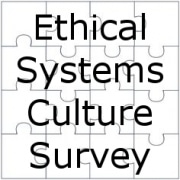Interested in an Ethical Culture? Build an Ombuds Program
Guest post by John W. Zinsser, Pacifica Human Communications, LLC.
Grievances cannot be redressed unless they are known, and they cannot be known but through complaints…If these are deemed affronts and the messengers punished as offenders, who will henceforth send petitions? …Where complaining is a crime, hope becomes despair. – Ben Franklin
 Benjamin Franklin never worked for a Fortune 500 company, but his analysis uncannily describes today’s corporate compliance culture. The massive increase of compliance operations (last year alone JP Morgan Chase added 13,500 compliance personnel) has occurred while the reporting of issues has actually declined. The growth in compliance begs the question: Why can’t people easily point out problems and know they will be addressed? Why do we believe that a massive and expanding corporate apparatus will ensure that what should happen actually does? Isn’t this a consistent false hope? It hasn’t worked yet.
Benjamin Franklin never worked for a Fortune 500 company, but his analysis uncannily describes today’s corporate compliance culture. The massive increase of compliance operations (last year alone JP Morgan Chase added 13,500 compliance personnel) has occurred while the reporting of issues has actually declined. The growth in compliance begs the question: Why can’t people easily point out problems and know they will be addressed? Why do we believe that a massive and expanding corporate apparatus will ensure that what should happen actually does? Isn’t this a consistent false hope? It hasn’t worked yet.
In fact, research such as the Ethics Resource Center’s 2013 National Business Ethics Survey demonstrates that as compliance programs become more rigorous, the percentage of employees reporting the illegal or unethical behavior they witness has dropped. Further, not only do these employees in rigorous compliance cultures report wrong-doing less often, they also do not ask questions or raise general concerns. This climate then limits the chances to reduce or prevent developing problems.
The truths described above are one important reason why the majority of the global workforce is either not engaged or actively disengaged (i.e. unhappy, unproductive and liable to spread negativity to coworkers). Gallup’s State of the Global Workplace study reports only 13% of the workforce is engaged and interested in making their workplace better. This demonstrates the accuracy of Franklin’s prophetic statement: Fewer complaints (because of increasingly formalized compliance climate?) contribute to greater “despair.” Isn’t there a better way?
Although Poor Richard didn’t know about it, there is a mechanism for employees of all levels to safely (without fear of retaliation) raise any concern or ask a needed question — an organizational ombuds program.
Properly constructed and executed organizational ombuds programs provide those who access the function a place to:
- Consider possible solutions;
- Navigate the complexity of today’s organizations;
- Sound out an idea; and
- Build a plan of action to address a situation.
As a result of being involved in these activities, the ombuds program is positioned to raise leadership’s awareness and understanding of key issues the organization faces.
Properly aligned, embedded, and integrated (AEI) ombuds programs make dramatic economic, organizational, and humanistic contributions in companies. Designated as neutral, an organizational ombuds program provides confidential support that helps to efficiently manage work-related issues. This informal function can also advance organizational self-correction through appropriate upward and outward feedback to generate systems improvements.
This function lowers legal and disputing costs by resolving issues at the lowest level. Ombuds programs also supplement other organizational functions (Compliance, HR, Legal, Safety, etc.) by helping guide those with a particular issue to the appropriate location.
AEI ombuds programs also aid organizations to live their espoused values, including being both ethical and safe. For example, UTC’s Ombudsman Steve Cordery estimates the ombuds function is responsible for up to 25% of the serious cases in their compliance system. Eaton Corporation, a Corporate Responsibility magazine 2013 top 10 “Best Corporate Citizen,” sites their program as a key tool for assuring they “Do Business Right.” Data from another Fortune 100 company in energy services has shown that facility-specific use of the ombuds function correlates with higher safety and lower time-loss injury scores.
Because organizational ombuds programs are independent, neutral, informal and confidential by definition, they create a “no-agenda/take-no-sides” channel where employees of every level have the best chance to fully review situations and evaluate options. Ombuds program users remain responsible for the issue and in control of the resolution mechanism, generating empowerment and creating greater process and outcome satisfaction, compared to formal functions that force particular protocols. Employees are more likely to come forward to share observed wrong-doing and organizational challenges when there is personal involvement in selection of the resolution method, especially when combined with a legally protected confidentiality. This unique value proposition allows ombuds help organizations assure that what should happen, actually does.
So where would you prefer to work?
A: A compliance-driven organization? Or
B: An ethical company with an empowering culture of engagement and trust where people ask questions and discuss problems?
I think we know which company Benjamin Franklin would invest in.
Almost everyone I ask chooses the company that commits to solve problems, behave ethically and advance as a whole through a safe and empowering tool: an organizational ombuds program.
Learn more about organizational ombuds programs:
Website
- ConflictBenefit.com (Pacifica)
Articles
- Schenck, Andrea and John Zinnser (2014) “Prepared to Be Valuable: Positioning Ombuds Programs,” Journal of the International Ombuds Association, Vol. 7, No. 1.
- Bogoslaw, David. “Ombuds programs: creating a culture of trust rather than compliance,” Corporate Secretary, June 17, 2015
- Paper delivered at the 2015 Society of Petroleum Engineers E&P Health, Safety, Security, & Environmental Conference (B. M. Bonnivier, M.C. Brooke-Lander, M. R. Lewis) The Organizational Ombuds Office and Corporate Social Responsibility: Driving Values in an Organization.
| Return to the blog | Explore our research topics |







